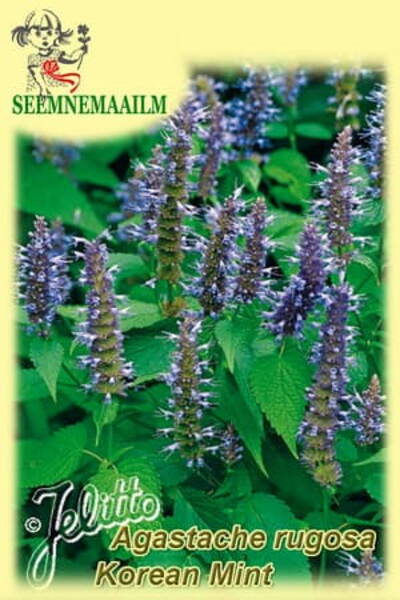Officinal (medicinal) plant. Juli-September. Winter hardiness zone: Z5-Z9. Height: 50 cm. Korean Mint, deep violet-blue, narrow blossom panicles, dark stems, compact, bushy habit, culinary herb, tea herb.
Perennial winter-hardy shrub up to a meter high. Native to Japan, Korea, China and the Russian Far East with straight stems and bluish-purple tubular flowers up to 1 cm long, collected in dense spike-shaped inflorescences. The only non-American representative of the genus Agastache.
The herb of the plant has a strong odor reminiscent of mint, oregano, and anise. It is used to prepare healing aromatic tea and as a seasoning for salads. In traditional Chinese medicine, the plant is known as "huo xiang" and is one of the 50 fundamental medicinal plants.
Part used: usually, the stem and leaves are used to prepare medicines from the lofant.
Application: tonic and anti-aging plant. Equalizes pressure, its essential oil has a bactericidal property.
This plant purifies the blood, helps to cure liver diseases, hepatitis, removes heavy metals from the body. Lofant preparations are used in the treatment of acute respiratory infections, bronchitis, pneumonia and bronchial asthma.
Lofant is used to normalize metabolism. Leaves, stems and flowers are used to treat gastritis, a functional disorder of the gastrointestinal tract.
Alcoholic infusion of flowers is useful to use internally and externally for paralysis, paresis.
Since ancient times, lofant has been used in Tibetan medicine. In the East, it is believed that this plant is a powerful biostimulant that can compete with ginseng. Only, unlike ginseng, lofant has a milder and longer-lasting effect on the body's immune system.
A decoction of the Tibetan lofant improves immunity, relieves fatigue, and restores strength after nervous breakdowns. In men who eat lofant leaves, potency increases. In addition, the plant effectively contributes to the treatment of prostatitis.
1,0 g = 2700 seeds.
Eng.: Korean Mint, Blue Licorice, Purple Giant Hyssop, Indian Mint, Patchouli Herb, Wrinkled Giant. Bot. syn.: Lophanthus rugosus.
* Purple Giant Hyssop has long been used by Tibetan monks to treat many diseases.
All parts of the plant are valuable, but the most sought after are its seeds, since they contain a large number of useful elements that bring great benefits to the body. Agastachis contains tannins, essential oils, alkaloids and various acids.
Application of Blue licorice seeds.
Patchouli Herb seeds help cope with pathologies of the gastrointestinal tract, liver and cardiovascular system. In addition, they rid the body of waste, toxins, heavy metals and perfectly cleanse the blood.
Also, the seeds of this plant reduce blood pressure, so they are recommended for use for hypertension. Products prepared from this raw material relieve inflammation present in the body, help cope with disorders of the nervous system, infectious diseases, diseases and damage to the epidermis, and they also improve potency.
Recipes for preparing Purple Giant Hyssop seeds.
Bath with Blue licorice seeds: pour 3 tablespoons of the product with 2 cups of boiling water. Next, the product should be wrapped and left for 30 minutes to infuse. After this, it must be filtered and added to a warm bath. The procedure takes 20 minutes.
Infusion of Blue licorice seeds: pour 1 teaspoon of the product with a glass of boiling water. Then the drink must be wrapped and left for 60 minutes to infuse. The infusion should be used throughout the day in equal portions.
Tincture on Purple Giant Hyssop seeds: pour 200 g of seeds with 0.5 l of vodka or double distilled moonshine. After this, place the product in a dark place to infuse for 30 days. The tincture must be shaken throughout the entire period. Next, it should be filtered. You need to use the finished product 20 drops 2 times a day.
Attention: Purple Giant Hyssop seeds help to cope with the above diseases only in case of long-term use of products prepared on their basis.
The average course of treatment is 30 days. If necessary, it can be repeated, but only after a 2-week break.
Effect on the body: tonic, regenerating, sedative, restorative, wound healing
Contraindications for use: low blood pressure, personal intolerance (allergy).















